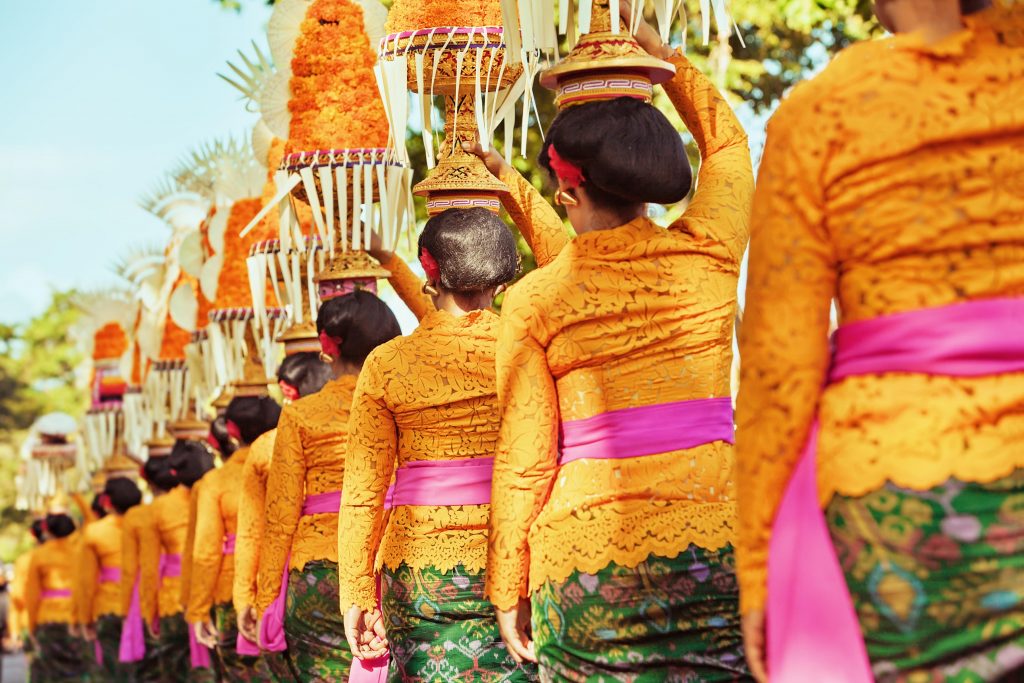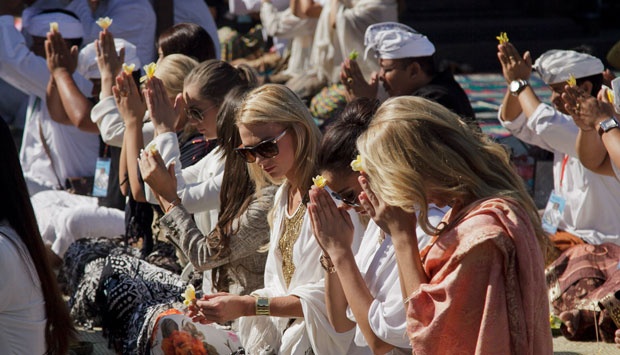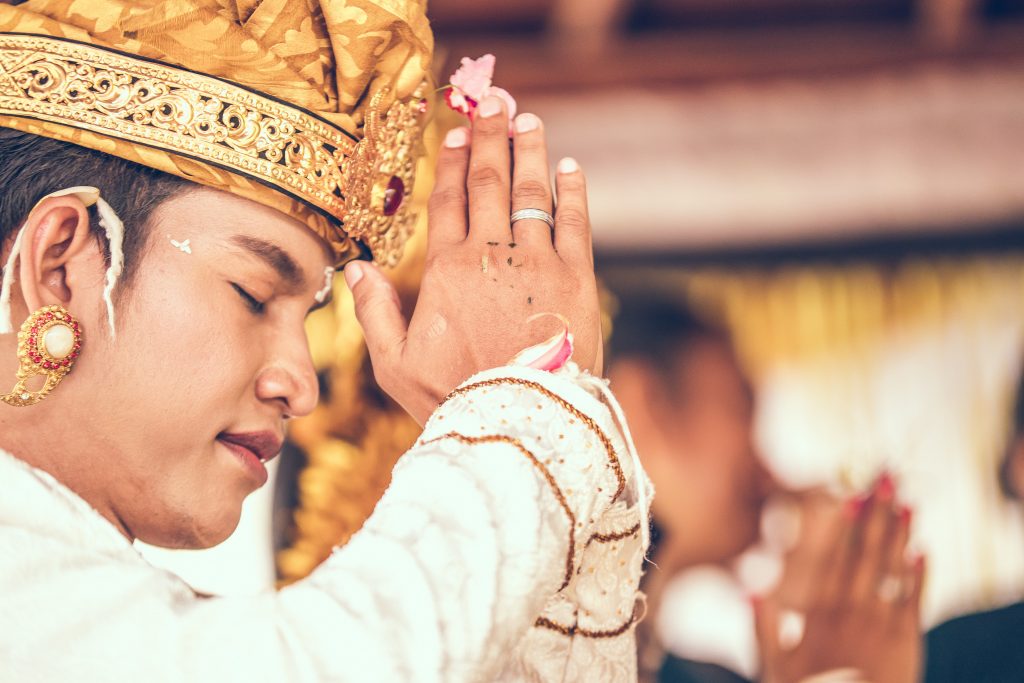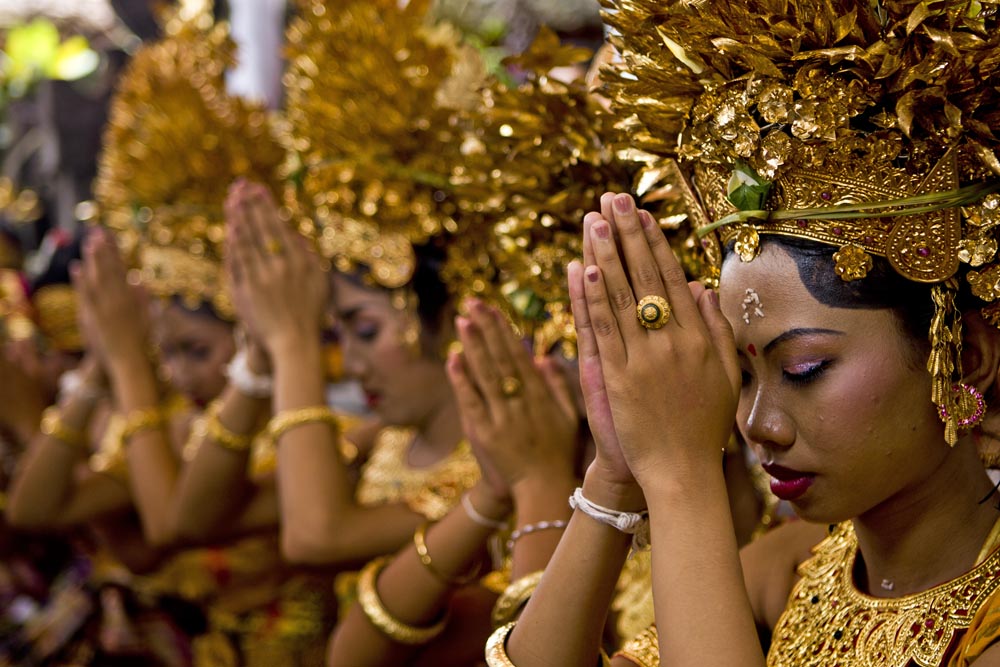The moment you land in Bali you are enveloped in Hinduism. The air is fragrant with incense and flowers everywhere. The Balinese are often dressed in colorful Balinese traditional dress and greet you with hands in namaskar, with, “Om swasti astu.” Which means “May God shower grace upon you;”
The drive from the airport takes you past huge sculptures with scenes from the Mahabharata and Bhagavad Gita.
Bali is an intensely Hindu community, perhaps because it is the sole Hindu majority district in an otherwise Muslim country. Hinduism has not just survived here, it has thrived, unscathed by the tumultuous events of India’s history over the last thousand years. Though elements of Balinese Hinduism are unique in all the world, most of the daily life of Balinese Hindus is easily recognizable–the rituals, culture, traditions, rites of passage, etc. Bali’s official religion is Hindu, but it’s far too animistic to be considered in the same vein as Indian Hinduism. The Balinese worship the trinity of Brahma, Vishnu and Shiva, three aspects of the one (invisible) god, Sanghyang Widi, as well as the dewa (ancestral gods) and village founders. They also worship gods of the earth, fire, water and mountains; gods of fertility, rice, technology and books; and demons who inhabit the world underneath the ocean. They share the Indian belief in karma and reincarnation, but much less emphasis is attached to other Indian customs. There is no ‘untouchable caste,’ arranged marriages are very rare, and there are no child marriages.
In some ways, Balinese Hinduism reflects a deeper philosophic understanding and a fuller incorporation into daily life than found in India. For example, here cremations are not an occasion for sorrow and mourning, but festive celebrations of the soul’s passing on to a better world. Balinese Hindus perform Trikal Sandhya, reciting the Gayatri Mantra and other Sanskrit slokas every day at 6am, noon and 6pm–a practice found in India among brahmins. A third example is Nyepi, the Day of Silence in which the island comes to a complete halt; even the electricity is shut off.
Bali’s unusual version of Hinduism was formed after the great Majapahit Hindu kingdom that once ruled Indonesia evacuated to Bali as Islam spread across the archipelago. While the Bali Aga (the ‘original’ Balinese) retreated to the hills in places such as east Bali’s Tenganan to escape this new influence, the rest of the population simply adapted it for themselves, overlaying the Majapahit faith on their animist beliefs incorporated with Buddhist influences. A Balinese Hindu community can be found in west Lombok, a legacy of Bali’s domination of its neighbor in the 19th century.
The most sacred site on the island is Gunung Agung, home to Pura Besakih and frequent ceremonies involving anywhere from hundreds to sometimes thousands of people. Smaller ceremonies are held across the island every day to appease the gods, placate the demons and ensure balance between dharma (good) and adharma (evil) forces.
Don’t be surprised if on your very first day on Bali you witness or get caught up in a ceremony of some kind.
The ancient Hindu swastika seen all over Bali is a symbol of harmony with the universe. The German Nazis used a version where the arms were always bent in a clockwise direction.
Religious Etiquette

- Cover shoulders and knees if visiting a temple or mosque; in Bali, a selandong (traditional scarf) or sash plus a sarong is usually provided for a small donation or as part of the entrance fee.
- Women are asked not to enter temples if they’re menstruating, pregnant or have recently given birth. At these times women are thought to be sebel (ritually unclean).
- Don’t put yourself higher than a priest, particularly at festivals (eg by scaling a wall to take photos).
- Take off your shoes before entering a temple or a mosque.
Showing Respect

Bali has a well-deserved reputation for being mellow, which is all the more reason to respect your hosts, who are enormously forgiving of faux pas if you’re making a sincere effort. Be aware and respectful of local sensibilities, and dress and act appropriately, especially in rural villages and at religious sites. When in doubt, let the words ‘modest’ and ‘humble’ guide you.
Dos & Don’ts

- You’ll see shorts and short skirts everywhere on locals but overly revealing clothing is still frowned upon, as is wandering down the street shirtless quaffing a beer.
- Many women go topless on Bali’s beaches, offending locals who are embarrassed by foreigners’ gratuitous nudity.
- Don’t touch anyone on the head; it’s regarded as the abode of the soul and is therefore sacred.
- Do pass things with your right hand. Even better, use both hands. Just don’t use only your left hand, it’s considered unclean.
- Beware of talking with hands on hips – a sign of contempt, anger or aggression (as displayed in traditional dance and opera).
- Beckon someone with the hand extended and using a downward waving motion. The Western method of beckoning is considered very rude.
- Don’t make promises of gifts, books and photographs that are soon forgotten. Pity the poor local checking their mailbox or email inbox every day.
Hinduism is one of the five religions officially recognized by Indonesia. The presence of Hinduism in Bali also serves as a reminder of diversity or ‘bhinneka tunggal ika’ (‘different but one’). Which is why Nyepi, one of their biggest celebrations is accepted by the government as national holiday. It is also during this time that business and government in Bali closes down in order to celebrate the event. Whether in Bali or all around Indonesia, major Hindu celebrations are celebrated as a whole.
Have you ever witness a Balinese religious celebration? Do you have any other additional tips? Tell us your experience in the comment section down below!





